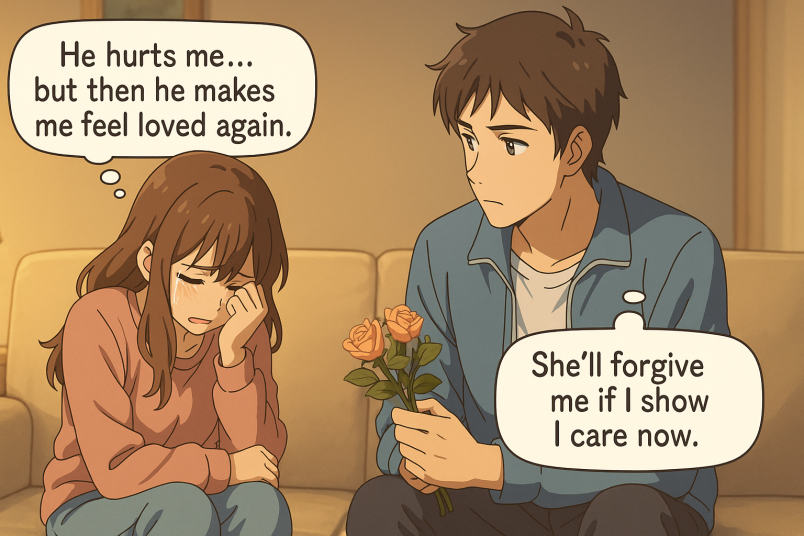Why Are Toxic Relationships Addictive? 7 Possible Reasons

Heal & Grow Daily for a Happier Relationship
Subscribe FREEKey Takeaways
Marriage.com AI Quick Summary
It’s strange how something that hurts can still feel so hard to let go of. You know it’s draining you, yet you keep going back, hoping things will be different this time. The late-night apologies, the sweet moments after chaos—they pull you in like gravity.
It’s not just love anymore; it’s a cycle that feels impossible to break. You tell yourself you’ll walk away, but your heart hesitates, remembering the good parts that never seemed to last.
If you’ve ever wondered, “Why are toxic relationships addictive?” the truth is often buried in the way they play with your emotions, comfort, and fear… leaving you tangled between what feels familiar and what you truly deserve.
What does it mean when a relationship becomes toxic?
A relationship becomes toxic when love starts to feel more painful than peaceful. It’s when affection turns into control, and conversations turn into constant tension. You begin to question yourself, tiptoeing around someone who once made you feel safe. Over time, the joy fades, replaced by confusion and self-doubt.
Yet somehow, you keep holding on… hoping the warmth will return. That’s often how people find themselves feeling addicted to a toxic relationship—trapped between the memories of love and the reality of hurt, unsure how something so wrong can still feel so familiar.
Why are toxic relationships addictive? 7 possible reasons
It’s hard to understand why something that hurts so much can still keep pulling you back. Toxic relationships can feel like emotional roller coasters—intense, unpredictable, and strangely irresistible. You might tell yourself you’re done, but the connection lingers, making it difficult to break free. Here are some reasons why toxic relationships can feel so addictive…
1. The dopamine rush from emotional highs and lows
Toxic relationships often create cycles of intense emotion—arguments followed by passionate reconciliations. These ups and downs trigger dopamine, the same “feel-good” chemical linked to reward and pleasure.
A study explored how romantic comedies influence the attitudes of college students toward toxic relationship behaviors. It highlighted how romcoms often romanticize control, emotional abuse, and overdependence, normalizing such toxicity. Using an 18-item questionnaire administered to 107 Indian students aged 17–22, the research analyzed perceptions through percentage-based data and graphical results.
You start craving those highs, even when the lows drain you. Over time, your brain begins to associate love with chaos, confusing excitement for connection, and keeping you stuck in the pattern.
Here’s how it actually happens:
- Your brain releases dopamine during reconciliation, making you feel relief and attachment.
- You start craving the emotional intensity rather than stability.
- The unpredictable cycle rewires your brain to associate love with adrenaline and stress.
2. The fear of being alone or starting over
Sometimes, the idea of being alone feels scarier than staying unhappy. You convince yourself that this love, though painful, is better than nothing.
Starting over means uncertainty, and that can feel exhausting when your self-worth is fragile. So you keep trying to fix what’s broken, hoping love will win—even if deep down, you know it’s hurting you.
Here’s how it actually happens:
- Loneliness triggers anxiety, making you settle for familiarity.
- You fear losing shared memories or the version of them you once loved.
- The thought of rebuilding trust with someone new feels overwhelming.
3. Trauma bonding and emotional dependency
When love and pain coexist, they create powerful emotional bonds. Moments of affection after conflict can feel like relief, making you cling tighter. This pattern—known as trauma bonding—makes leaving feel impossible.
You begin to depend on those fleeting moments of peace, forgetting that they come after hurt. It’s not love that keeps you tied; it’s the cycle of emotional survival.
Here’s how it actually happens:
- Your brain releases oxytocin during brief loving moments, reinforcing attachment.
- You mistake temporary calm for emotional safety.
- The push-pull dynamic convinces you that enduring pain means proving love.
4. Low self-esteem or self-worth issues
When you don’t fully believe you deserve better, you’re more likely to accept less. Toxic partners often exploit that vulnerability, making you question your value.
You start mistaking attention for affection, and apologies for change. Each time they say “I’m sorry,” you hope it means love… but instead, it just deepens the cycle of disappointment and self-doubt.
Here’s how it actually happens:
- You rely on their validation to feel worthy or loved.
- Every small act of affection feels like proof that you matter.
- Over time, you lose sight of your own boundaries and needs.
5. The illusion of “fixing” or saving your partner
You tell yourself they just need love, patience, or understanding—and maybe they’ll change. That belief gives you purpose, but it also keeps you trapped. You become more focused on healing them than protecting your own peace.
Sadly, this “rescuer” role often leads to exhaustion and heartbreak, because real love shouldn’t require constant repair or sacrifice of your happiness.
Here’s how it actually happens:
- You internalize their struggles as your responsibility to fix.
- Their temporary improvements give you false hope for lasting change.
- The cycle repeats, reinforcing your belief that love must involve sacrifice.
6. Intermittent reinforcement keeps you hooked
When affection and kindness appear unpredictably, it strengthens attachment. One day they’re cold and distant, the next they’re loving again—and that inconsistency makes you crave more.
Psychologically, this is known as intermittent reinforcement, a powerful motivator. You keep chasing the good moments, believing the next one will make up for all the pain before it.
Here’s how it actually happens:
- Random positive moments release dopamine, creating emotional highs.
- You learn to tolerate mistreatment, waiting for the next “good day.”
- The inconsistency strengthens your emotional dependence instead of weakening it.
7. Unresolved childhood attachment wounds
Sometimes, the roots of toxic attachment go way back. If you grew up feeling unseen, rejected, or unsafe, you might subconsciously seek familiar patterns in adulthood.
The impact of childhood trauma on well-being and adult behavior was examined through insights from nine clinical professionals in Ireland. It was found that trauma is linked to low self-esteem, denial, substance misuse, depression, and anxiety. Early interventions and tailored support were emphasized as vital for resilience and recovery.
Toxic love feels like “home,” even when it hurts. Healing begins when you recognize that comfort isn’t always healthy… and that real love feels steady, respectful, and safe—not chaotic or uncertain.
Here’s how it actually happens:
- You repeat old emotional patterns that mirror childhood dynamics.
- Familiar pain feels safer than unfamiliar peace.
- Without healing those wounds, you confuse inconsistency with intimacy.
What are the signs you are in a toxic relationship?
Sometimes, it’s not easy to see the damage when you’re deeply attached to someone. You might brush off constant arguments, excuses, or the feeling of walking on eggshells as “normal.” But if you often feel drained, anxious, or unsure of your worth around your partner, it could be something deeper.
When you’re addicted to a toxic relationship, the emotional highs and lows start feeling like love itself. Here are some of the most common signs of an addictive or toxic relationship to watch out for.
-
You feel controlled by your partner
A common sign of a toxic relationship is feeling like your partner controls your every move. You might have internalized asking for permission and checking in with your partner every time you do something.
Asking for permission, even for the smallest of things, and feeling obligated to do so, is one of the many addictive relationship signs. You’re addicted to feeling like you need to be looked after or told what to do.
-
Your partner verbally or physically abuses you
If you constantly get into screaming matches with your partner where you’re left defeated, and you continue to stay with him regardless, you might be addicted to drama in the relationship. This toxic love addiction makes you think your relationship has passion, but it is abusive.
If your partner physically abuses you, like hitting you or hurting you during sex, then brushing it off as their love language is wrong. If you think it’s a small price to pay to be with them, that’s a big sign you’re addicted to a harmful relationship, and you need to get out.
-
You feel uncomfortable around your partner
If you feel like you can’t open up to your partner or are scared to do so, that could be a sign of a toxic relationship. Another reason you might feel uncomfortable is if they are trying to make you behave like a person you’re not — they are trying to change you.
If you think changing your personality is a good thing just so you can be with your partner is a good thing, then you’re only fooling yourself, and you’re addicted to toxic relationships.
Psychologists often talk about how if someone is trying to change who you are as a person, even when you don’t want to, then it’s time to think about breaking an addiction to a toxic person.
-
Your partner doesn’t trust you
If you have to always keep your partner in the loop about what you’re doing or who you’re with, and they throw tantrums when you miss a call, it shows that they don’t trust you.
If you think this shows how much they care about you, you’re deluding yourself, and it probably means you’re addicted to toxic relationships. Trusting your partner is a sign of a healthy relationship. Be aware of jealousy—it has the power to take over your relationship.
If you’re always attracting jealous partners, then it’s time to figure out the best way to avoid toxic relationships. And if you’re in one right now, it’s time to call it off.
-
Your partner treats you like a child
Toxic partners tend to infantilize their partners. They make you feel helpless and tell you that they will look after you.
For example, your partner convinces you that nothing you do is good enough and that you should listen to them and do things their way. If you agree, you will start doing whatever they tell you.
Does this sound familiar?
If yes, then it probably means you’re being controlled, and it could mean you could grow to get addicted to toxic relationships.
Infantilizing you is the best way someone can make you feel powerless. A balance of power is necessary for a healthy relationship. Any unbalanced relationship tends to be toxic.
Can you break the addiction to a toxic relationship? 5 tips
How to break addiction to a toxic relationship isn’t just about leaving someone—it’s about untangling your heart from the habits, memories, and emotions that kept you hooked.
It takes time, patience, and kindness toward yourself. Healing doesn’t happen overnight, but little by little, it does happen…
1. Acknowledge what’s really happening
The first step is honesty—with yourself. Stop minimizing the pain or making excuses for their behavior. Accepting that the relationship is unhealthy can feel painful, but it’s also freeing.
Once you see things clearly, you can begin to take back your power and make choices that protect your peace.
- Do this: Write down specific moments that hurt or make you anxious. Seeing them on paper helps remove emotional fog. Talk to someone you trust about what’s been happening and listen to their perspective without defending your partner’s behavior.
2. Create emotional and physical distance
Space helps you see things more clearly. That might mean cutting off contact for a while, or at least reducing communication.
It’s hard at first—you’ll miss them—but the quiet allows you to reconnect with your own needs and emotions. With distance, clarity starts to replace confusion.
- Do this: Mute their messages, avoid checking their social media, and spend time in new environments. Fill your schedule with calming routines—walks, journaling, or creative hobbies—to redirect your focus from them to yourself.
3. Surround yourself with safe support
You don’t have to do this alone. Talk to trusted friends, family, or even a therapist who understands what you’re going through.
Safe people remind you of your worth when you start to forget it. Their support becomes a bridge between where you are and where healing begins.
- Do this: Reach out to someone who listens without judgment and share your feelings. Join a support group or online community for people recovering from toxic relationships. Let others remind you that you’re not alone in this journey.
Watch this TED Talk by Dr. Janie Lacy, a leading relationship trauma psychotherapist, as she shares how self-compassion and inner healing can help you break free from toxic relationship patterns and build healthier love:
4. Focus on rebuilding your self-worth
Toxic relationships often leave you doubting yourself. Take time to rediscover who you are outside of that dynamic.
Do things that make you feel strong, creative, and alive again! The more you nurture your confidence, the less power that old attachment will have over you.
- Do this: Make a daily habit of affirming your strengths—say them out loud if you can. Take up activities that make you feel capable and proud, like learning something new, volunteering, or exercising.
5. Learn to find peace in calm
After the chaos, calm can feel strange… even uncomfortable. But real love isn’t supposed to be dramatic—it’s steady, respectful, and kind.
Give yourself permission to rest, breathe, and embrace quiet moments. Over time, peace will stop feeling empty and start feeling like home.
- Do this: Spend a few minutes each day in silence—meditate, stretch, or simply sit with your thoughts. Practice gratitude for small things, and remind yourself that peace isn’t boring; it’s a sign of emotional safety.
Choosing healing over chaos
Toxic relationships can feel like a storm you can’t escape—chaotic, thrilling, and deeply confusing.
You might keep wondering, “Why are toxic relationships addictive?” even when your heart already knows the answer. It’s because love, hope, and pain get tangled together, making it hard to separate what feels familiar from what’s healthy.
But healing begins the moment you choose peace over chaos. It’s not about forgetting them—it’s about remembering yourself. Little by little, as you rebuild trust in your own strength, you’ll realize that real love doesn’t hurt; it heals, uplifts, and lets you breathe again.
 Tips
Tips
Write your tip or submit a video tip
All tips are reviewed before the publishing.
Share this article on
Recent Articles
Related Quizzes
Heal & Grow Daily for a Happier, Healthier Relationship
Subscribe FREE on YouTube We'd love your feedback!
We'd love your feedback!
 Expert Q&A
Expert Q&A
Ask your question related to this topic & get the support you deserve from experts.


 Reviewed by
Reviewed by
















 Thanks for your feedback!
Thanks for your feedback!